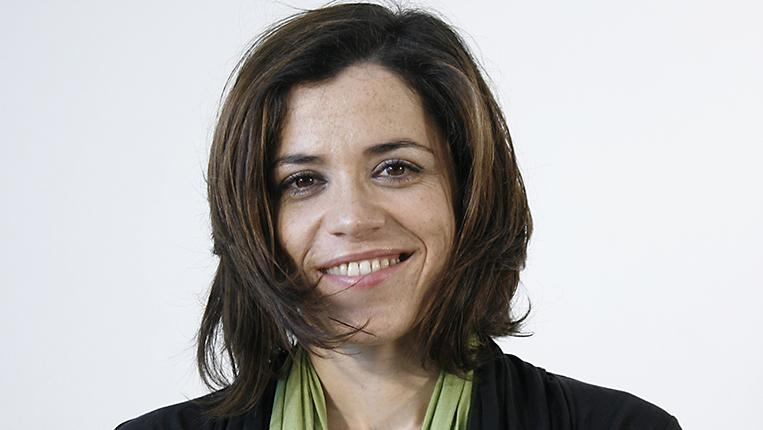
Inês Reis holds a degree in Psychology from the Faculty of Education and Psychology at Universidade Católica Portuguesa and is currently a Master's student in Psychology at the same faculty. Her academic path has been marked by a profound interest in understanding human behaviour and active involvement in university life, currently serving as the President of the Faculty’s Students' Union. She considers her experience at Católica "truly transformative" and highlights the close relationship between students and staff, the spirit of mutual aid, and the constant stimulus for critical reflection and personal growth. Inês Reis aspires to follow a professional path linked to intervention with children and young people, motivated by the desire to contribute to healthier, more inclusive, and more conscious environments.
Why did you choose to study Psychology?
I chose Psychology because I’ve always had a great curiosity about understanding people’s behaviour. Since I was young, I’ve questioned what lies behind our attitudes and ways of being. When I started researching these questions more, I realised that all the answers I was looking for pointed to Psychology, and that’s when I was sure this was the right path for me.
What fascinates you most about this field?
What fascinates me about Psychology is its capacity to look at the human being on multiple layers simultaneously. The way it integrates emotions, behaviour, relationships, and social context, among others, makes it a profoundly multidimensional science. Nothing in Psychology exists in isolation; everything connects and influences everything else. Furthermore, it is a field that is constantly evolving. It works with people, and there is nothing more complex, unpredictable, and challenging than ourselves. Each case, each context, and each discovery opens up new questions, and that feeling of never-ending exploration is what excites me the most.
“Católica demonstrates a constant desire to innovate.”
You hold a degree in Psychology from the Faculty of Education and Psychology at Católica and are currently also a Master's student in Psychology. How would you describe your experience at Universidade Católica?
My experience at Universidade Católica has been truly transformative. When I started in the first year, I couldn't imagine how much this journey would contribute to my growth, not just as a student, but especially as a person. Here, I discovered new abilities, developed autonomy, and gained a maturity that I carry with me into all areas of my life. I feel that Católica challenged me to step out of my comfort zone and look at the world with a more critical and human perspective. Contact with very diverse colleagues allowed me to recognise the richness of diversity, learn from different experiences, and create relationships that I know will last. On the lecturer side, I found professionals who not only transmitted knowledge but also awakened new ways of thinking and questioning in me. It has been a demanding journey, it’s true, but it is precisely that level of challenge that has made it so rewarding.
What distinguishes Universidade Católica?
What truly distinguishes Universidade Católica is the way it combines academic excellence with a humane and close-knit environment. The relationship between faculty and students is very close. The lecturers are accessible, available, and demonstrate a genuine interest in our journey, which makes learning more personalised and motivating. Among the students, there is also a strong spirit of mutual aid. Instead of competition, there is collaboration, sharing, and mutual support, which contributes to a more balanced and healthy academic path.
Another outstanding aspect is the institution's future-oriented vision. Católica demonstrates a constant desire to innovate, to keep up with societal changes, and to respond to the demands of the job market. It invests in the quality of teaching and in comprehensive education, preparing us not only to practice a profession but also to be conscious and active citizens.
You are currently the President of the Students' Union of the Faculty of Education and Psychology. What goals guided your mandate?
We are now in the last month of the mandate, and looking back, I would say our main objectives were to ensure solid and active student representation, making sure their needs and interests were heard and taken into account. We also wanted to create and promote opportunities that would add value to students' academic and personal journeys, ranging from training initiatives to extracurricular experiences. Another important commitment was to make the Union more open to the outside world, building bridges with projects and organisations outside the university.
“Being President of the Students' Union allowed me to develop several essential skills.”
What activities and initiatives would you like to highlight?
In terms of integration and welcoming, we were present at Welcome Week, contributing to the reception of new students, and we participated in the Teen Academy, which allowed us to represent the Union to pre-university students and showcase the academic reality of our Faculty.
Regarding personal development, we created the In(forma-te) series, through which we promoted workshops focused on essential life and professional skills, enabling us to respond to the concrete needs of the students. This year, we also started working more closely with the Faculty, which facilitated communication, the dissemination of opportunities, and the feeling of belonging.
We got involved in key projects like UCP2 MentalHealth and Peer2Peer, reinforcing our commitment to student well-being and mental health. We also had the honour of participating in the celebrations of the 20th anniversary of the Faculty’s Psychology Degree, organising a dinner integrated into International Week, which brought together students, staff, and international students in a moment of sharing and intergenerational connection.
On the social front, we organised festive events that achieved higher levels of participation this year than in previous years, which demonstrates greater connection and involvement from the student community. In parallel, we established several partnerships in the leisure area because we believe that the academic journey is also built outside the classroom.
How has your work in the Students' Union contributed to your development?
Being President allowed me to develop several essential skills. Leadership was one of them, by coordinating a team, making decisions, and representing students with a sense of responsibility. I also gained experience in project organisation and management, which required me to plan, define objectives, and ensure everything happened on time. Time management played a fundamental role in balancing the Union work with my Master's and other responsibilities, making me more organised and efficient. Communication was another area where I grew considerably: working with students, staff, and different organisations helped me listen better, negotiate, and adapt the message to each context. Furthermore, I learned to deal with unforeseen circumstances, find solutions quickly, and work with people with different perspectives.
This was a journey I started in my very first year, when I joined the Students' Union, and I wouldn't trade it for anything. All this experience gave me greater autonomy, a sense of responsibility, and the capacity to represent the interests of others. Overall, it was a challenge that made me grow.
“The idea of contributing to healthier, more inclusive, and conscious environments highly motivates me (...)"
What are your plans for your professional future?
Right now, my main focus is to finish my Master's with a good performance and consolidate everything I have been learning. After that, the goal is to get a professional internship in an area that makes sense to me and allows me to grow. The truth is that Psychology has so many areas of intervention that I still feel there is a lot to explore; at the moment, the feeling is almost one of wanting to try everything. Even so, there is one area that particularly attracts me: intervention with children and young people. I would like to be able to work directly with them, but also with their families and the contexts that surround them. In parallel, I am very interested in the aspect of prevention and the development of projects that can have a real impact before problems arise. The idea of contributing to healthier, more inclusive, and conscious environments highly motivates me, and that is what I hope to build in my professional career.
How can Mental Health be promoted among young people so that they realise its importance from an early age?
Promoting mental health among young people involves, above all, ensuring that the topic exists in their daily lives naturally, accessibly, and without prejudice. The best way to start is through mental health literacy education: teaching them from an early age to recognise emotions, understand what psychological suffering is, and know when and whom to ask for help. This can happen in schools, youth associations, local communities, local councils, or specific projects; the important thing is that the information is clear, continuous, and adapted to the language of young people. Another essential dimension is prevention. Working on socio-emotional skills, self-esteem, stress management, conflict resolution, interpersonal relationships, and healthy use of technology can prevent many situations from escalating. Projects in schools, community programmes, or initiatives developed by specialised professionals and technicians can have a huge impact when they are consistent and close to the reality of young people.
“Young people tend to trust those who are closer to their reality more.”
How can we contribute to normalising the conversation about mental health and encourage young people to seek help?
When mental health is treated with the same normality as physical health, the labels and fears associated with asking for help disappear. It is important to replace alarming rhetoric with informed conversations, include real testimonials, and create spaces for sharing where young people feel they can talk without being judged.
Peer support is another key factor. Young people tend to trust those who are closer to their reality more. Informal support projects among colleagues, listening groups, and mutual aid initiatives, when accompanied by professionals, help reduce isolation, identify signs, and handle more delicate situations sensitively. Furthermore, it is crucial that resources are accessible and visible. Support lines, digital platforms, psychologists in schools or youth centres, municipal offices, or community projects can make a difference when young people know whom to turn to and feel that there are no barriers to access.
Normalising mental health means showing that asking for help is not a sign of weakness but rather of self-awareness and responsibility. It involves families, teachers, health professionals, and the community itself in a cultural change that values psychological well-being as much as any other dimension of life.



